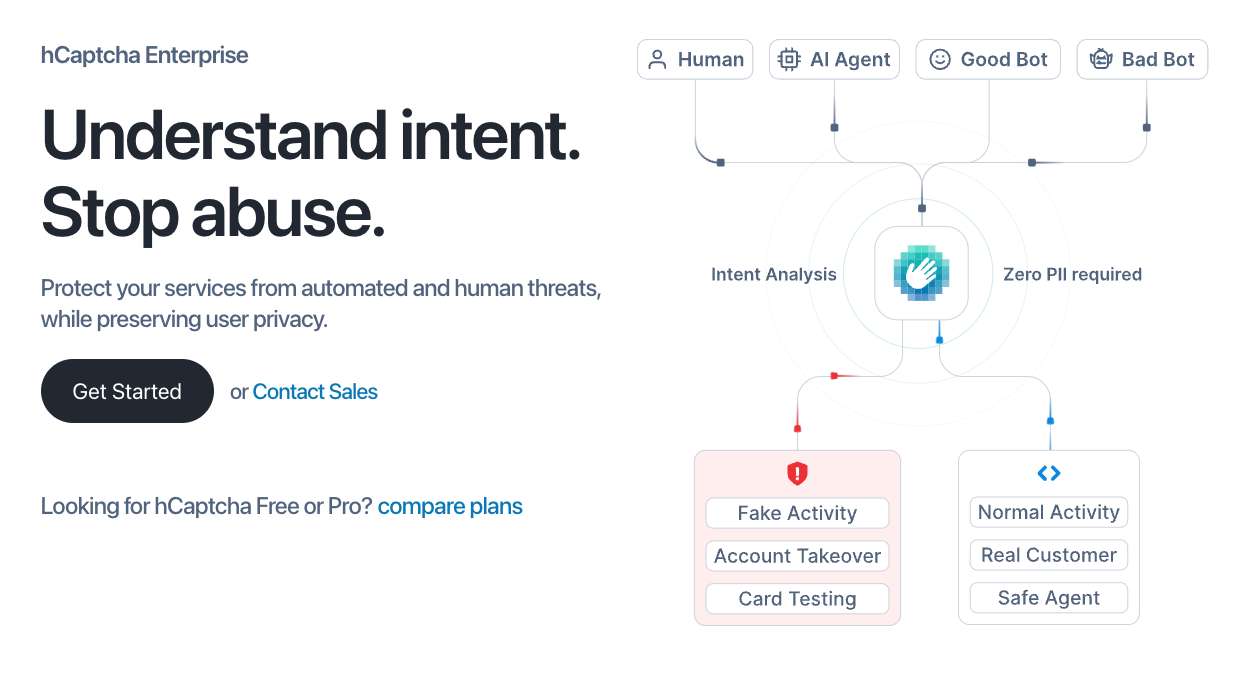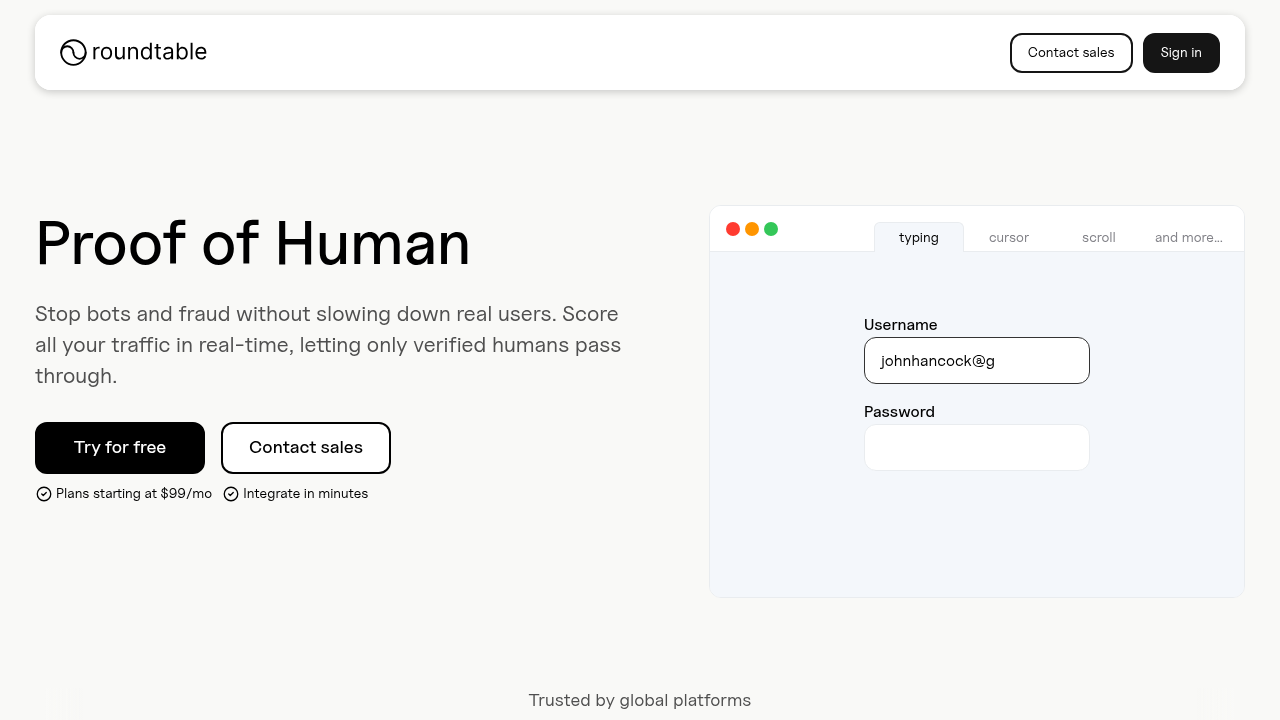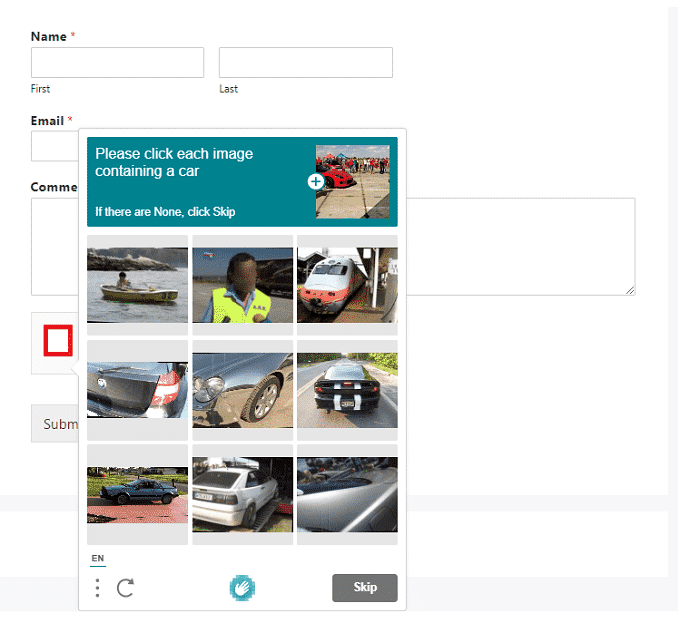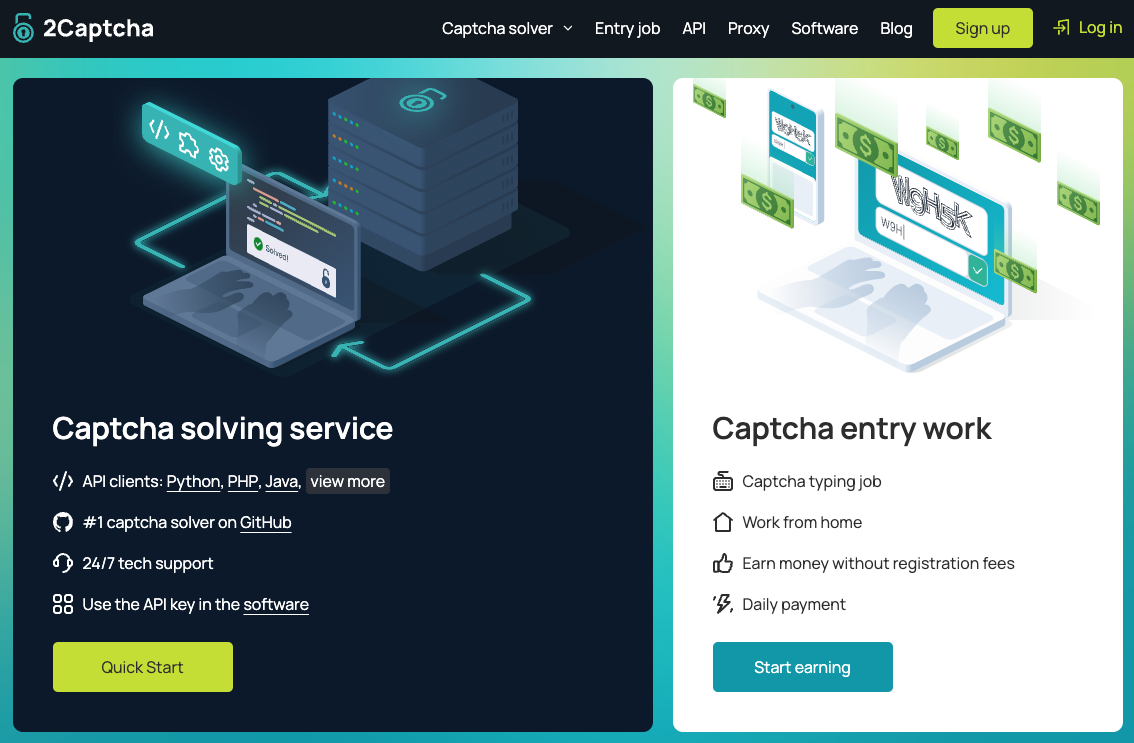10/03/2025. When you're protecting your website from bots, you face a classic trade-off: security that actually works versus keeping real users happy. Most teams end up choosing between image puzzles that frustrate customers or invisible systems that miss sophisticated attacks. If you're looking for the best
hCaptcha alternative, the decision gets trickier when weighing invisible systems that might miss sophisticated attacks against visual challenges that catch more bots but frustrate users. Here's my take on how Roundtable and hCaptcha handle different bot protection scenarios and which approach delivers better results for your specific use case.
TLDR:
- Roundtable achieves 87% bot detection accuracy with zero user friction vs 65% for hCaptcha
- hCaptcha requires cookies and image challenges that cause up to 15% page abandonment rates
- Roundtable operates invisibly using behavioral biometrics without collecting personal data
- Traditional CAPTCHAs are increasingly vulnerable to AI-powered solving techniques
- Roundtable integrates as a one-line API while maintaining privacy compliance
hCaptcha is a service of Intuition Machines, a US company focused on machine learning in the field of image recognition. hCaptcha mainly uses image recognition challenges to try to distinguish between human users and bots.
hCaptcha provides bot and fraud management solutions for organizations that require rapid deployment and strict privacy compliance to defeat sophisticated attacks.
This approach focuses on checking user responses to visual challenges rather than tracking behavioral patterns across websites. The system requires users to prove their humanity through explicit interaction with image-based tasks.
Challenges typically involve identifying images containing specific objects. Users simply click on the images that match the criteria. While generally clear-cut, these challenges can occasionally be more complex with blurry or subtle distinctions, requiring retries.
The service's business model leverages hCaptcha’s crowdsourced image labeling. When users solve hCaptcha challenges, they unknowingly contribute to labeling vast datasets of images. This labeled data is then used to train machine learning algorithms for its parent company's machine learning operations.
What Roundtable Is and How It Works
Roundtable provides an invisible, continuous bot detection solution called "Proof of Human" that operates fundamentally differently from traditional CAPTCHAs. Rather than presenting challenges to users,
Roundtable analyzes behavioral patterns in real-time to instantly distinguish genuine human users from automated bots.
The system uses world-class research in cognitive science and behavioral biometrics to detect subtle patterns that reveal automated behavior. This includes analyzing keystroke dynamics, mouse movement patterns, scrolling behavior, and other micro-interactions that create unique human signatures.
Unlike image-based verification systems, Roundtable requires no user interaction. It functions through a one-line API that runs silently in the background, providing continuous protection while legitimate users remain completely unaffected.
The solution collects no personally identifiable information and avoids cross-site tracking, maintaining user privacy while delivering explainable results.
This behavioral approach means websites can verify human users without any friction, eliminating the traditional trade-off between security and user experience. The system provides clear explanations for its risk assessments, making security decisions auditable and understandable.
Bot Detection Accuracy Comparison
We tested five leading invisible CAPTCHA and bot detection systems (including Roundtable Proof of Human, Google reCAPTCHA v3, hCaptcha, FingerprintJS Pro, and Cloudflare Turnstile) against traditional bots, browser automation tools, and AI agents in
thorough testing.
Modern CAPTCHA detection rates range from 33% to 87%, with systems that rely on both behavior and device signals greatly outperforming device-only approaches.
| Solution |
Bot Detection Rate |
Method |
| Roundtable Proof of Human |
86.7% |
Behavioral biometrics |
| Google reCAPTCHA v3 |
69.3% |
Risk scoring |
| hCaptcha Invisible |
64.7% |
Image challenges |
| FingerprintJS Pro |
36.0% |
Device fingerprinting |
| Cloudflare Turnstile |
33.3% |
Device and network signals |
Roundtable Proof of Human achieves best-in-class bot detection accuracy (87%) compared to hCaptcha (65%), Google (69%), and others. This shows a major performance advantage over competing solutions, with Roundtable achieving more than 25% higher accuracy than reCAPTCHA and more than double the detection rate of Cloudflare Turnstile.
hCaptcha's 99.9% Passive Mode presents "challenges" to the user when the system is uncertain or believes the interaction is likely from a bot. During testing, we considered hCaptcha successful if it presented a challenge to the bot we programmed. This makes the comparison not entirely apples-to-apples with fully invisible systems and means the 64.7% for hCaptcha is effectively a ceiling on performance.
ThOur testing methodology evaluated systems across real-world web interaction tasks against different automated agents, providing a complete view of each solution's effectiveness against modern bot threats.
User Experience and Friction Analysis
hCaptcha challenges are typically much more difficult than reCAPTCHA challenges, and can contribute to user friction. Stanford University found that image-based CAPTCHAs can lead to a 15% page abandonment rate, representing a substantial impact on conversion rates for websites that use visual challenge systems.
hCaptcha and reCAPTCHA v2 both present challenges that users need to solve. hCaptcha's challenges typically involve image recognition, where users click on images containing specific objects. While straightforward, these can sometimes be blurry or have unclear distinctions, leading to frustration and retries.
The study also shows how text-based or audio-based CAPTCHA challenges affect conversion rates.
Traditional CAPTCHA tests with manual interaction can reduce a website's conversion rate by up to 3.2%.
In contrast, Roundtable operates completely invisibly. Users never encounter challenges, puzzles, or verification steps. The system analyzes behavioral patterns in the background without requiring any user interaction, eliminating friction entirely while maintaining superior security.
The Internet faces a friction tax today: the average CAPTCHA takes humans 35 seconds to complete, representing a major time waste that Roundtable eliminates entirely through its invisible approach.
This friction becomes particularly problematic on mobile devices, where typing and image selection can be cumbersome. Users often abandon forms or purchases when faced with difficult CAPTCHA challenges, directly impacting business revenue.
Privacy and Data Collection Practices
hCaptcha positions itself as more privacy-friendly than other solutions like Google reCAPTCHA, yet it still relies on cookies and presents privacy challenges.
One of the main drawbacks of using hCaptcha is that it may not be compatible with some browsers or devices that do not support cookies. As other
hCaptcha vs reCAPTCHA comparisons find, for its functionality, users with privacy-focused configurations may encounter accessibility issues.
Roundtable takes a privacy-preserving approach, collecting no personally identifiable information and avoiding cross-site tracking entirely. The system focuses exclusively on behavioral signals without storing personal data, maintaining strict compliance with privacy regulations while preserving user trust.
This approach aligns with growing privacy requirements without compromising security effectiveness. Organizations can implement the best CAPTCHA solutions without worrying about cookie consent banners or data retention policies.
The distinction becomes particularly important for organizations handling sensitive data or operating in jurisdictions with strict privacy requirements, where cookie-based systems may create regulatory complications.
hCaptcha Limitations and Vulnerabilities
The use of hCaptcha has limitations in terms of privacy compliance, usability and accessibility. If these issues are a high priority for your enterprise, you may want to consider other options that offer more complete features than hCaptcha.
Recent hiccups in hCaptcha bypass show ongoing challenges. While some captcha-solving services (2captcha being a prime example) have quietly removed
hCaptcha bypass vulnerabilities from their guides, online solvers present an ongoing challenge to organizations that rely on CAPTCHAs for security.
Traditional CAPTCHAs like hCaptcha, which are based on text or image challenges, are also vulnerable to machine learning solvers. As AI image recognition continuously improves, the image recognition approach that hCaptcha relies on is increasingly susceptible to AI-powered solving techniques.
Finally, there are also significant accessibility concerns with using hCaptcha. Users with visual impairments may struggle with image-based challenges, while audio alternatives are often unclear or difficult to understand.
Roundtable as the Superior Alternative
Roundtable tackles the limitations of traditional CAPTCHA approaches through its "behavioral biometrics" technology. It uses behavioral and cognitive signatures to tell humans and bots apart.
While hCaptcha requires users to solve visual puzzles and relies on cookies for functionality, Roundtable operates invisibly without any user interaction or data collection. This removes the friction that causes conversion rate losses while providing superior security through continuous behavioral analysis.
The accuracy advantage is substantial, with Roundtable achieving 87% bot detection compared to the industry standard of 33-69% based on internal benchmarks. This performance gap shows the difference between effective protection and persistent bot infiltration.
Roundtable's privacy-preserving approach also makes it suitable for organizations with strict compliance requirements, while its explainable results provide transparency that image-based systems cannot match. The system scales smoothly without the accessibility concerns that affect visual challenge systems.
For organizations seeking effective bot protection without user friction or privacy concerns, Roundtable provides a complete solution that tackles the core limitations of traditional CAPTCHA approaches.
The behavioral approach also future-proofs against evolving bot threats. As AI becomes more sophisticated at solving visual puzzles, behavioral patterns remain difficult to replicate at scale.
FAQ
How long does it take to integrate Roundtable compared to hCaptcha?
Roundtable can be set up in minutes using a one-line API or script. hCaptcha requires similar setup time but adoption is slowed by additional configuration for cookie compliance and challenge customization.
What's the main difference between behavioral detection and image challenges?
Behavioral detection analyzes how users naturally interact with websites (mouse movements, typing patterns) invisibly, while image challenges require users to actively solve visual puzzles to prove they're human.
Can I switch from hCaptcha to Roundtable without affecting my users?
Yes, switching to Roundtable actually improves user experience by eliminating all visual challenges and friction, while providing better bot detection accuracy at 87% versus hCaptcha's 65%.
Why does Roundtable achieve higher accuracy than traditional CAPTCHAs?
Roundtable continuously monitors behavioral patterns throughout user sessions, detecting subtle automation signatures that are difficult for bots to replicate, while image-based systems only check single challenge responses.
When should I consider moving away from hCaptcha?
If you're experiencing high bounce rates, privacy compliance issues with cookies, or accessibility concerns from visual challenges, Roundtable's invisible approach eliminates these problems while providing superior protection.
Final thoughts on choosing effective bot protection
The choice between traditional image challenges and invisible behavioral detection comes down to what you value most: user experience or familiar technology.
Roundtable delivers superior accuracy at 87% while eliminating the friction that drives away 15% of your visitors. Your users never see puzzles, your compliance team avoids cookie headaches, and your conversion rates stay intact. The future of bot protection doesn't require a trade-off between security and smooth user experiences.



